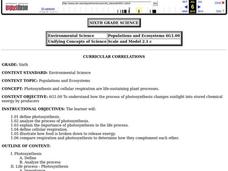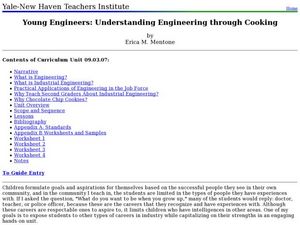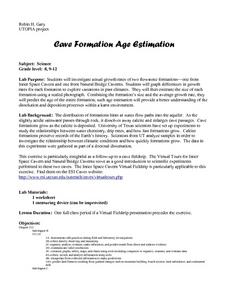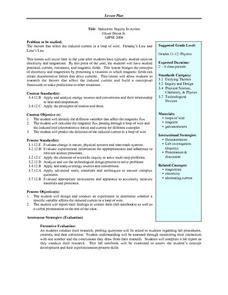Curated OER
Roebling and Suspension Bridges: A Thread of Steel
Students create a model bridge using steel. In this bridges lesson plan, students study John Augustus Roebling and how he created bridges out of steel and the impact it had on society. Then students build their own bridge model.
Curated OER
Bridges
Ninth graders use model-building to help comprehend the forces and phenomena at work in the world around them. They describe gravity as a universal force that pulls everything toward the center of the earth. Students distinguish between...
Curated OER
Monet's Japanese Bridge -A Scientific Journal
Fourth graders design a bridge and answer critical questions about scientific inquiry and enterprise in a Science journal.
Curated OER
Photosynthesis
Sixth graders are introduced to the process of photosynthesis by discussion and then by participating in an experiment. They then answer questions as independent practice project.
Curated OER
Rock Cycle
Third graders identify various types of landforms of the United States. They discuss earth movements that produce geologic structures and landforms and define cycle as it relates to rocks and soil. They demonstrate the processes forming...
Bridge
Mercury - Mercury is Rising
Hold a discussion in your class about the increase in mercury being found in fish that are caught commercially as food for humans. Given a worksheet, learners then calculate how much fish a person can safely eat each month to remain...
Curated OER
Weather is Cool, Hot or Somewhere In-Between
Students access the Internet to record data on weather. They use email to answer a younger classes' questions about the weather.
Curated OER
Polymerization Experiments
Learners study the concepts of polymerization and the function of crosslinkage. In this polymer activity students complete a lab activity and write down their observations.
Curated OER
Young Engineers: Understanding Engineering Through Cooking
Second graders explore different engineering careers. In this math instructional activity, 2nd graders create a winning cooking recipe. They role play a mock cookie sale during the culminating event.
Curated OER
Hazard Mitigation: Bioterrorism
Students discuss different ways to spread infectious diseases. In this bioterrorism lesson, students model the rate of smoke emission using CalRoad software. They analyze the effects of airborne release of biological...
Curated OER
Matter
Fifth graders investigate the structure of matter. They examine pictures of atoms and molecules and discuss their relationships, and construct a model of a molecule using toothpicks and gumdrops.
Curated OER
Rivers: Short In-class Activity
Students make observations, estimates, and interpretations. They view Images of the James River at Belle Island, Virginia, including one at flood stage, a plot of peak stream flow since 1935, and an image of potholes in the Petersburg...
Curated OER
Cave Formation Age Estimation
Learners investigate growth rates of flowstone formations. They view a virtual field trip and discuss how flowstones form. They observe the cave fieldtrip and predict the growth rate for a cave formation. They graph growth rates and...
Curated OER
Oceanography
Fourth graders define new vocabulary associated with oceanography. They locate and label the four oceans. They also identify features of the ocean floor.
Curated OER
Earth's History
Seventh graders study the law of superposition by creating models of fossils in layers of rock. They examine how fossils are usually found in sedimentary rock which leads to the study of geologic history in those rocks.
Curated OER
Structure of the Earth
Eighth graders describe and identify the three layers of the Earth. They work together to construct their own earth model. They share their creation with the class.
Curated OER
Motions and Forces
Sixth graders investigate the construction of a magnet and the force it produces. They identify various materials as magnetic or non-magnetic, discuss the properties of magnetic properties, and conduct an experiment with a compass and...
Curated OER
Oceanography (Rivers and Streams)
Second graders examine the characteristics of streams and rivers. They identify the types of resources lakes, ponds and oceans provide. They ask questions to complete the lesson.
Curated OER
Ocean Currents
Fourth graders work in groups to research ocean currents and create posters with their findings. They locate the patterns and names of major ocean currents and identify them on a map. Students also use red pencil to show ocean currents...
Curated OER
Induction: Inquiry in Action
Students investigate the factors that affect the induced current in a loop of wire. They discuss Faraday's Law and Lenz's Law. Students identify the different variables that affect the magnetic flux and calculate the magnetic flux...
Curated OER
It's the Slime Time
Students experiment to understand the basic concept of polymerization and to understand the dissolution theory. Student experiment with polymers to understand its behavior and the mechanical behavior of polymer networks.
Curated OER
Earth
First graders define what a planet is and study the planet earth. They examine the effects of the sun on the earth and make a model.
Curated OER
Oceanography
Fifth graders study the topography of the ocean floor. They determine its ever changing nature as they examine currents and trade winds. They write paragraph describing how the winds might affect land formations after the discussion of...
























